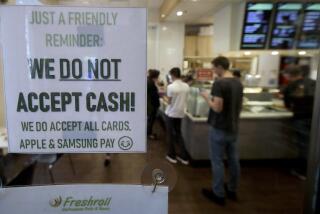Israel eyes cashless economy to boost tax collection
JERUSALEM â Will that be cash or credit? Depends whoâs asking, but Israelis may soon not have much of a choice.
On Tuesday, the Israeli Cabinet approved establishing a committee to propose ways of reducing cash transactions and increasing electronic payment methods to combat the underground economy and tax evasion.
Using cash can help create an off-the-books economy, allowing a gap between reported economic activity and genuine economic activity, as well as encouraging tax evasion and other financial crimes, the cabinet statement said.
The public loses because billions of shekels, Israelâs currency, go untaxed and donât contribute to the treasury, according to Harel Locker, the director general of the prime ministerâs office and the head of the new committee. It is expected to submit recommendations in 90 days.
One option is offering incentives to encourage a transition to the use of electronic debit cards, not particularly widely used in Israel. These wouldnât incur additional costs and are more accessible to a wide range of citizens than are credit cards.
The government aims to increase various other methods of electronic payments, including mobile phones and other mobile devices. According to media reports, it is mulling a ban on the use of cash altogether in taxis, kiosks and even market stalls.
Alongside future incentives, enforcement is expected to tighten and the government may lower the current limit of 20,000 shekels (about $5,700) for cash transactions between businesses â and extend those requirements to consumers as well.
A recent report by Visa on Europeâs âshadow economyâ (an estimated $2.8 trillion), suggests nearly 19% of Israelâs GDP is off the books, the equivalent of about $50 billion.
(That is higher than estimates for North America and Western Europe but similar to Mediterranean economies, including Spain, Greece and Italy.)
Among the big industries prone to such business are diamonds (a major export branch), car dealers and shops, and construction. The study maintains that switching to electronic payments could put around 13 billion shekels ($3.7 billion) back into the reported economy.
In recent months, Israeli authorities launched a campaign against tax evasion, including a snitch-line (officially called the Justice Line).
But paying cash might be a tough habit to kick.
A recent poll found that nearly 40% of Israelis 18 to 34 and more than a quarter of those between 35 and 54 prefer to pay off the books.
If the government wishes to advance toward a cashless society, it might consider the reasons.
Thirty-six percent of respondents cited a high tax burden as their reason for under-the-counter business and another 13% cited unequal distribution of resources, 7% said they followed a social norm, while 8% pleaded the ultimate argument: âthe desire to not be a sucker.â
Besides Locker, the committee created by the cabinet will include the police commissioner and senior officials of the tax and anti-money laundering authorities, and representatives of the Bank of Israel and the justice and finance ministries.
ALSO:
Order freezing assets of Egyptâs Islamist leaders upheld
First witness testifies in Hague trial of Kenyaâs deputy president
Russia says no proof Syriaâs government carried out chemical attack
More to Read
Sign up for Essential California
The most important California stories and recommendations in your inbox every morning.
You may occasionally receive promotional content from the Los Angeles Times.










